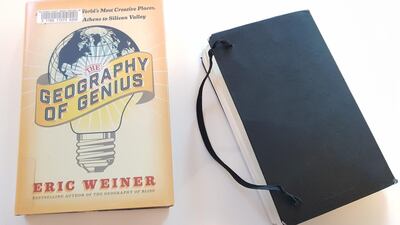One of the more entertaining books I've read this summer was Eric Weiner's The Geography of Genius: A Search for the World's Most Creative Places (Simon & Schuster, 2016). From Athens to Silicon Valley, Calcutta to Florence and Vienna, Weiner looks at why particular cities have played host to "genius", and speculates about how surroundings influence ideas. Truth be told, it's not just geography that determines success, but a confluence of factors.
Weiner doesn't include the Middle East in his book, but I can't help but think of the UAE in many of the circumstances he describes. While popular myth imagines cities such as Florence as being magically endowed with beauty and effortless talent, this was far from the case. Of Florence, Weiner writes: "The city was swampy, malarial, and prone to regular outbreaks of fire, flood and the bubonic plague. It had no port and was surrounded by spiteful, occasionally bellicose, neighbours. Some of these other city-states were bigger (Venice had a population three times that of Florence) or, such as Milan, stronger militarily. Yet the Renaissance shined brightest not in these places, but in Florence."
The main reason, Weiner argues, was money. Florence was a city of merchants and bankers, and, thanks to the Medici family's need for religious propaganda, they were great patrons of the arts. While artists such as Michaelangelo, Leonardo and Donatello weren't in it for the cash, they benefited from a system that allowed them to pursue their work without worrying about it. Yet, far from inhabiting lofty studios, they usually worked in sweatshop-like conditions.
Abu Dhabi's purchase of the world's most expensive painting, Da Vinci's Salvator Mundi, on show at Louvre Abu Dhabi from September, isn't the only Renaissance parallel. Sultan Al Qassimi, the UAE's leading art collector, who we interview in next month's Ultratravel magazine, would put many western art figures to shame.
Last year, a photography exhibition at New York University Abu Dhabi looked at the influence Gulf cities have on urban design. And although Abu Dhabi doesn't have a big art school – perhaps it should – how many generously funded UAE students abroad are poised to return?
_________________________
Read more from Rosemary:
How to approach immigration officials
Is the coverage of the deported Swedish woman anything more than fake news?
Why we should all join the e-bike revolution
Cabin fever offers us big life lessons
_________________________
Even more intriguing than wealth is the importance of difficulty in the creation of genius, Weiner says. "Creativity does not require perfect conditions. In fact, it thrives in imperfect ones." Neither, it follows, do places need to be ideal aesthetically or people of genius to arrive fully fledged. Achievements are made in gritty circumstances by "scrappy" individuals who may not achieve fame until after death. "Paradise is antithetical to genius. Paradise makes no demands, and creative genius takes root through meeting demands in new and imaginative ways."
Neither was genius uncensored, says Weiner. In much of Renaissance Italy, atheism wasn't tolerated; Athens didn't take kindly to its gods being insulted.
Yet ironically and even more interestingly, the reason why I and many others travel is to uncover the history of places from behind our own lack of knowledge, and to confront our own effectively censored, incomplete and surprising pictures of people in time and place. That is the true genius of travel – and why it is so valuable.

